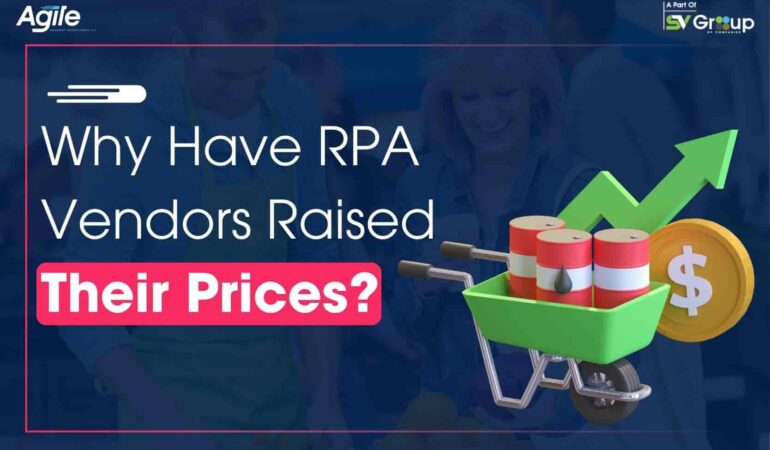Why Have RPA Vendors Raised Their Prices?

Most RPA vendors have done what no one was expecting, especially considering RPA’s popularity. They have increased prices! A few have increased prices by 4 – 5 times than their previous prices. As an increasing number of organisations consider RPA migration, raising prices makes no sense.
Apart from the migration, there is an ever-increasing threat of a recession. During economic downturns, businesses proceed to cut costs in every area possible. The choice is quite obvious when they must decide between business survival and RPA. So, why would RPA vendors go down this path?
Reasons Behind Increase in RPA Prices
There are numerous plausible explanations behind the recent price increases. However, based on our experience and conversations with leading RPA voices, these reasons are the most likely explanations for the increase:
- Low Growth
During the pandemic, every tech company anticipated high growth. What they did not realise was that the growth was only temporary. As the pandemic waned and the world returned to normalcy, user behaviour was back to normal. Thus, they failed to anticipate the dip in demand.
Suddenly, it was no longer feasible to retain the employees that organisations hired at the height of the pandemic to capitalise on the increasing demand. The growth projections were wrong. It is the story of almost every tech company, including Meta. They recently laid off more than 20,000 workers due to poor planning.
Organisations are increasing prices to offset the impact of the drastic dip in demand and recoup investments. RPA vendors are no exception. They are only jumping on the bandwagon and doing what every other organisation is doing to improve their profitability.
- Competition
Previously, the RPA industry was only offering a handful of players. Today, it is no longer the case. There are multiple RPA vendors, some of which are focusing on niche markets. For instance, Electroneek primarily focuses on managed services providers, whereas Microsoft Power Automate targets larger organisations.
The proliferation of RPA vendors means more players are competing for the same market. Due to the increasing competition, RPA vendors are facing low profitability. In order to boost their finances and remain competitive, they are resorting to price increases. They plan to utilise the funds to improve their capabilities.
- Integration with Emerging Technologies
RPA is not the same technology as 10 or 15 years ago. It has truly come a long way since then. Nowadays, RPA vendors must focus on integrating RPA with emerging technologies such as artificial intelligence. Hyper automation is the future of RPA. However, integration does not come cheap.
RPA vendors must focus on revamping their products, undertaking considerable research and development, and hiring expert resources. The only way to recover these costs is to pass these expenses to the consumer by raising platform prices. Otherwise, RPA vendors may not be financially viable.
What’s the Solution? RPA as a Service
Businesses that rely on RPA need not worry about price increases. The reason is that Agile Managex Technologies offers RPA as a Service. It means there is no need to pay huge upfront costs. There is no requirement to buy hardware or software either. All you need to do is pay the subscription fee, and that’s it.
As a leading RPA solutions company in Dubai, we have successfully implemented RPA in organizations across different industries. This vast experience lets us understand your requirements more effectively than any other RPA company. It helps us design cost-effective solutions to your unique challenges.
Conclusion
The recent price increases are not without risk. With so many alternatives available, businesses can easily switch to a more cost-effective platform rather than continue with the more expensive vendor. Rather than increase prices, RPA vendors should first focus on meeting the ever-changing business automation needs.

Leave A Comment